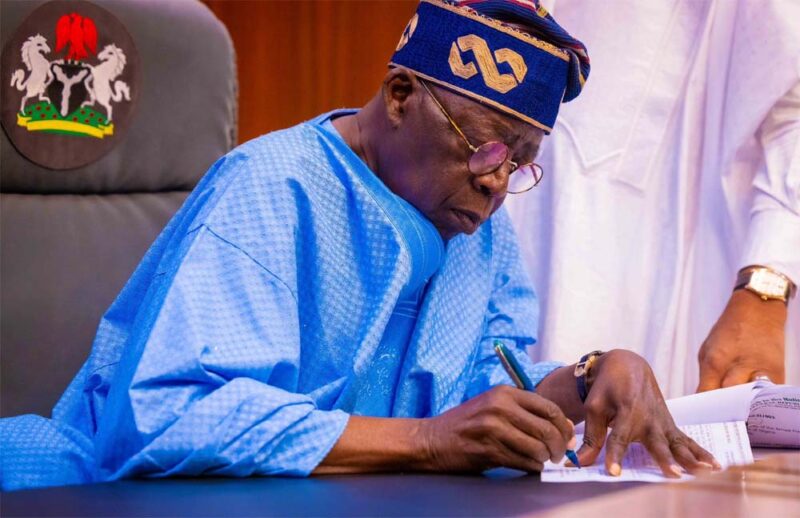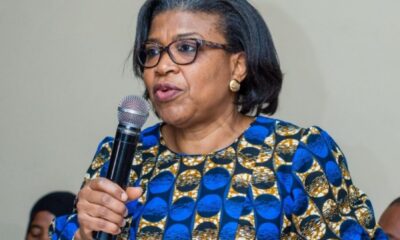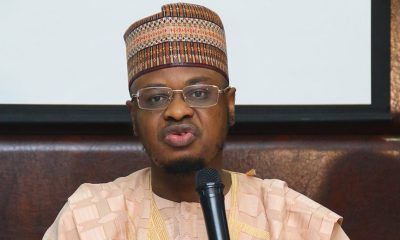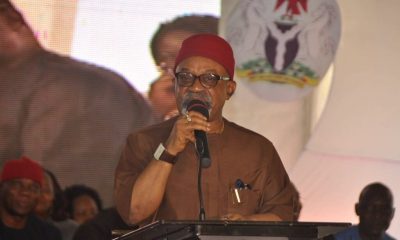News
From Obasanjo to Buhari… how FG’s debt profile surged 86.8% to N26.9trn in 21 years

Nigeria’s public debt has been on the rise. Despite securing debt relief during the Olusegun Obasanjo-led administration, successive governments have continued on a borrowing spree — the federal government’s component of the public debt surging 86.8 percent to N26.9 trillion in the last 21 years.
This has raised concerns among Nigerians on the debt sustainability of the country amid dwindling revenue to meet the debt obligations to creditors.
Within two weeks, the senate approved three different loan requests by President Muhammadu Buhari.
On July 7, 2021, the upper chamber approved a loan request of N2.343 trillion, approximately $6 billion and another $8.3 billion and €490 million.
Defending one of the loan requests, the Debt Management Office (DMO) said it is part of a borrowing plan for the 2021 budget.
“The proposed new capital raising is the new external borrowing provided in the 2021 Appropriation Act to part finance the deficit in the budget. In other words, the new capital raising has already been approved in the budgetary process by the executive and legislative arms of government,” the DMO had said in a statement.
As of March 2021, Nigeria’s total public debt has hit N33.1 trillion ($87.24 billion) — an accumulation of borrowings from successive governments, of which most were borrowed since the return to democratic rule in 1999.
The overall public debt is the total debt accrued by federal, states, and the FCT from local and international lenders.
Of the N33.1 trillion, the federal government alone borrowed N26.91 trillion — this includes the FGN bonds, Sukuk, green bonds and Euro bonds.
Finally, after weeks of data aggregation, number crunching, dissecting and analyses of freedom of information (FOI) response from the Debt Management Office (DMO), TheCable presents findings that highlight how Nigeria’s aggressive borrowing defies its fiscal responsibility laws.
The analyses also include data from the DMO, National Bureau of Statistical (NBS), and fiscal papers from the Budget Office of the Federation.
FG DEBT CLIMBED 86.8% TO N26.9 TRILLION IN 21 YEARS
Data from the DMO seen by TheCable showed that federal government borrowings (local and foreign debt) climbed from N3.55 trillion in 1999 to N26.91 trillion at the end of March 2021 (the country’s latest official figure).
This represents an 86.8 percent increase in 21 years, comprising the administrations of Olusegun Obasanjo, Umar Musa Yar’Adua, Goodluck Jonathan, and the current Muhammadu Buhari.
From Obasanjo to Buhari… how FG’s debt profile surged 86.8% to N26.9trn in 21 years
HOW MUCH BUHARI BORROWED IN 6 YEARS
The Budget Office’s medium-term expenditure framework and fiscal strategy paper from 2015 showed that the Buhari-led administration incurred N7.63 trillion in domestic debt from June 2015 to December 2020.
On external borrowings, President Buhari increased debt from $7.3 billion in 2015 to $28.57 billion as of December 2020. This means that the president incurred $21.27 billion on foreign loans to the country’s debt portfolio.
The country’s exchange rate moved from N197 to a dollar in 2015 to N381 at the end of December 2020.
Analysis of consolidated debt showed that the external debt increased by 291.37 percent while domestic debt grew by 86.31 percent in the last six years of the Buhari government.
Overall, the Buhari-led government has had an accumulated debt of N17.06 trillion as of March 2021, using the N381 exchange rate. This represents a 173.2 percent increase from when he was elected president in 2015.
public debt
DEBT PROFILE UNDER JONATHAN’S ADMINISTRATION
At the beginning of former President Goodluck Jonathan’s tenure in 2011, the federal government had an accumulated debt of N6.17 trillion.
Analysis of the debt figure showed that local debt amounted to N5.62 trillion while foreign debt stood at $3.5 billion (about N548.65 billion, using the exchange rate of N156.7/$1).
By the end of 2015, the foreign debt component hit $7.3 billion, while domestic debt increased by N8.4 trillion. The country’s exchange rate also stood at N197/$1.
Overall, the federal government component of the total public debt increased from N6.17 trillion in 2011 to N9.8 trillion in 2015, representing an increase of N4.18 trillion or 74.37 percent.
public debt
YAR’ADUA/JONATHAN’S BORROWINGS
Under the Umar Musa Yar’Adua/Goodluck Jonathan-led government between 2007 and 2011, domestic debt of the federal government moved from N2.17 trillion to N5.62 trillion. The foreign component of the debt also increased from $2.11 billion to $3.5 billion within the period.
The country’s exchange rate also moved from N116.8/$1 to N156.7/$1.
The combined debt profile increased from N2.42 trillion to N6.17 trillion in four years, representing a 155 percent jump.
Of the debt figure, Jonathan completed the tenure from May 2010 to May 2011 after the death of Yar’Adua. The period saw a surge in the federal government’s debt from N4.94 trillion to N6.17 trillion. This represents a 37.4 percent increase in one year.
OLUSEGUN OBASANJO’S TENURE
During the tenure of former president Olusegun Obasanjo, the debt level of the federal government reduced from N3.55 trillion in 1999 to N2.42 trillion at the end of 2007.
The 8-year term of Obasanjo resulted in a dip in FG’s local and foreign debt level, representing a 32 percent decline.
The country’s exchange rate was between N98.02 to N116.8 to a dollar during the tenure.
Analysis of the figures showed that external debt decreased from $28.04 billion by 1999 to $2.11 billion at the end of 2007. However, the domestic component increased from N798 billion to N2.17 trillion within the same period.
The huge decline in foreign debt was a result of the substantial reduction following the pay-off of the outstanding debts owed to the London Clubs of Creditors in the first quarter of 2007.
BUHARI, NIGERIA’S BIGGEST BORROWER, VIOLATING FINANCIAL LAWS
So far, Buhari is the country’s biggest borrower, increasing public debt (FG component) by more than 173 percent. Next to the Buhari government is the Yar’Adua/Jonathan administration with a 155 percent surge in borrowing.
The current government violates important financial laws in the country — the Fiscal Responsibility Act, and the CBN Act 2007.
Last year, the government exceeded the fiscal borrowing threshold as stipulated in the fiscal act.
Zainab Ahmed, minister of finance, budget and national planning, admitted to this on the grounds that COVID-19 was good enough reason to breach the act.
The fiscal responsibility law provides a limit of three percent debt threshold for sustainability, but the president can “exceed the ceiling if there is a clear and present threat to national security or sovereignty of Nigeria”.
In 2020, the country’s budget deficit was at about four percent of GDP, clearly breaking the law.
On overdraft, section 38, sub-section 1 and 2, of the CBN Act, said, “the Bank may grant temporary advances to the Federal Government in respect of temporary deficiency of budget revenue” and “the total amount of such advances outstanding shall not at any time exceed 5 percent of the previous year’s actual revenue of the Federal Government”.
By the end of 2020, CBN overdrafts to the Buhari government exceeded the limit by 69 percent of the revenue generated in 2019 – in a blatant violation of the apex bank rules. The government’s revenue in the year was N4.1 trillion, and overdraft stood at N2.9 trillion.
Also, Nigeria’s borrowing limit as a percent of GDP stood at 34.8 percent in 2020, well above 25 percent for the year. Earlier this year, the federal executive council (FEC) had strategically raised the borrowing limit to 40 percent in its Medium-term debt management strategy for Nigeria for the period 2020-2023.
While Nigeria’s debt-to-GDP is lower than those of its peers, its debt-to-revenue is too low to sustain the country. Of every N100 government makes in revenue, N97 now goes to debt servicing.
In the last four administrations, only Obasanjo’s team reduced public debt; his government recorded a 32 percent decline with the London Club agreement.
INCREASING PUBLIC DEBT WORRYING
While borrowing is required to support the economy, sustainability transparency and sustainable repayment plan are crucial.
Femi Oke, an economist, said Nigeria’s soaring high debt profile is not good for the country.
“The Nigerian government borrows in the worst possible way and in a very outdated manner. This causes a backlash to the government. Because Nigeria’s debts are not linked to any assets, we just go to the treasury bill market and borrow, at any rate, that anybody wants to give you,” he said.
“There are many other countries who borrow more than what Nigeria is borrowing and don’t have any problem paying back. They borrow intelligently and efficiently, in a way that their debts service themselves.
“A more efficient way of borrowing is for the Federal Government to migrate all the debts to asset-linked debts. This means structuring the borrowing transaction like investments. There must be an underlying asset to which borrowers can use to recover the principal they gave the country plus profit.”
Vahyala Kwaga, senior researcher and policy analyst at BudgIT, said the level of borrowing – specifically in 2021- is the highest it has been in the last six years.
“The government is borrowing more, spending more and earning less revenue. For context, the government budgeted about N5.37 trillion in revenue in 2020 but only earned a total of N3.42 trillion,” Kwaga said.
“There is also no commensurate rise in revenue to counteract the continuing rise in debt servicing. A casual look at the debt servicing level from 2015 to 2020 shows that the level has steadily increased since then.
“These amounts include debt servicing on interests for ‘ways and means’ and ‘sinking fund to retire maturing Loans.’”
NIGERIA’S ACTUAL DEBT COULD BE 48.7TRN
Wilson Erumebor, a senior economist at Nigerian Economic Summit Group, said Nigeria is a case where expenditure keeps rising, revenue not improving as expected, creating a wide fiscal deficit that is majorly financed by borrowing.
“While borrowing is required to support the economy, especially given the impact of the pandemic, what we need to be concerned about is how sustainable Nigeria’s debt position is,” he said.
“Debt has risen N33.1 trillion as of March 2021, an increase of 162.7% in the space of about five years.
“When we include AMCON’s liabilities and CBN’s ways and means, debt could amount to about N48.7 trillion, which is around 32 percent of GDP.
“Debt to GDP may seem quite low at 32 percent, we must understand that debt is serviced with revenues, so if debt servicing is increasing and revenue is not performing, then we have a problem.”
Erumebor suggests that the federal government must improve efficiency, transparency, blocking leakages, and deliver value on public projects, despite limited resources.
“We must work towards unlocking many sectors and many areas where the country can earn revenue.”
In 2020, the International Monetary Fund (IMF) said Nigeria’s low debt-to-GDP ratio is highly vulnerable to shocks.
“Despite Nigeria’s relatively low debt level, liquidity-based indicators-driven by low revenue mobilisation-remain concerning, with the interest bill representing a high share of government revenue (but low relative to GDP),” IMF said in its country’s report for Nigeria.
“Stress scenarios confirm the vulnerability of public debt to a low growth/wide primary deficit scenario. The interest-to-revenue ratio is particularly vulnerable to a real interest rate shock but remains sustainable.”
Recently, market researchers at United Capital also expressed concern over the country’s rising debt sustainability risk. “The government has historically justified its rising debt profile by the compliant debt-to-GDP ratio of less than 30.0%,” the research firm said.
“However, we reiterate our position that the FG’s debt service cost as a percentage of revenue is a fairer reflection of the country’s debt sustainability position.”
At an overall public debt of N33.1 trillion ($87.24 billion), the implication remains that every Nigerian owes both local and foreign organisations N165, 500.
News
BREAKING: Tinubu Assents to 2026 Electoral Act, Sets Stage for 2027 Elections

BREAKING: Tinubu Assents to 2026 Electoral Act, Sets Stage for 2027 Elections
President Bola Ahmed Tinubu has signed the 2026 Electoral Act Amendment into law, setting the legal framework for Nigeria’s 2027 general elections.
The signing ceremony took place on Wednesday at the Presidential Villa in Abuja, with Senate President Godswill Akpabio and Speaker of the House of Representatives Tajudeen Abbas in attendance.
The new law, formally known as the 2026 Electoral Act (Amendment) Bill, was recently harmonised and passed by both chambers of the National Assembly amid debate and opposition from minority lawmakers.
The legislative process leading to the signing saw intense deliberations in both the Senate and the House of Representatives. Lawmakers constituted a joint conference committee to reconcile differences between their respective versions of the bill before transmitting the harmonised document to the President for assent. Earlier, Senate President Akpabio had indicated during an emergency plenary session that the President was expected to sign the amended bill before the end of February. That projection materialised within days.
One of the most significant changes introduced by the 2026 Electoral Act is the reduction of the mandatory notice period for general elections from 360 days to 300 days. Lawmakers explained that the adjustment is intended to give the Independent National Electoral Commission (INEC) greater operational flexibility in planning and conducting elections without breaching statutory timelines.
READ ALSO:
- Korope Drivers Shut Down Lekki–Epe Expressway Over Lagos Ban (Video)
- Kano Closes Entertainment Centres Ahead of Ramadan
- Asari Dokubo Warns Igbo Groups Against Sparking Religious Conflict in Rivers
The issue of electronic transmission of election results generated considerable debate throughout the amendment process. Under the new law, electronic transmission is permitted, while manual collation remains legally recognised, particularly in areas where technical or connectivity challenges arise. INEC retains the authority to issue detailed regulations and guidelines governing how results are transmitted and managed. Supporters argue the compromise reflects operational realities, while critics maintain that the changes may weaken transparency safeguards introduced in previous reforms.
Beyond these headline issues, the amended Act also makes adjustments to party primary timelines, candidate nomination processes, and collation procedures. It includes technical corrections across multiple clauses to improve clarity, reduce ambiguities, and strengthen administrative consistency ahead of the 2027 polls.
With presidential assent now secured, the 2026 Electoral Act becomes the binding legal framework governing presidential, National Assembly, governorship, and state House of Assembly elections. INEC is expected to review and align its regulations and operational guidelines with the new provisions as preparations intensify for the 2027 general elections.
The signing marks a pivotal moment in Nigeria’s democratic process, with political parties, civil society groups, and voters closely watching how the revised electoral framework will shape the next election cycle.
BREAKING: Tinubu Assents to 2026 Electoral Act, Sets Stage for 2027 Elections
News
Korope Drivers Shut Down Lekki–Epe Expressway Over Lagos Ban (Video)

Korope Drivers Shut Down Lekki–Epe Expressway Over Lagos Ban (Video)
LAGOS, Nigeria — Tension erupted on Tuesday along the Lekki–Epe Expressway as commercial mini-bus operators, popularly called korope drivers, staged a protest against a state-imposed ban on their operations along the corridor. The demonstration, which occurred during peak hours around the Ajah axis, caused vehicular movement to nearly grind to a halt, leaving hundreds of commuters stranded and triggering heavy traffic gridlock across adjoining routes. Eyewitnesses reported that drivers parked their buses across the carriageway, chanting and demanding the immediate reversal of the restriction.
Security operatives were deployed to restore order, and traffic flow gradually resumed after several hours of disruption.
Some of the protesting drivers said the ban threatens their primary source of income, as the Lekki–Epe corridor has historically been one of the most profitable routes for informal transport operators. “We have families to feed. You cannot just wake up and push us off the road without providing an alternative,” one driver told reporters. The operators called on the government to reconsider the policy or integrate them into the new transport structure rather than exclude them entirely.
READ ALSO:
- Kano Closes Entertainment Centres Ahead of Ramadan
- Asari Dokubo Warns Igbo Groups Against Sparking Religious Conflict in Rivers
- Bauchi Reduces Working Hours for Civil Servants During Ramadan
The Lagos State Government, however, defended the restriction, describing the protest as unlawful and disruptive to public order. Authorities explained that the Lekki–Epe Expressway has been designated as a Mass Transit and Regulated Transport Corridor under the state’s Bus Reform Initiative, aimed at modernizing public transport, improving safety, and reducing traffic chaos caused by unregulated operations.
According to Sola Giwa, Special Adviser to the Governor on Transportation, consultations were held with transport stakeholders before enforcement, and the transition was not sudden. Small vehicles such as korope buses are now expected to operate on feeder and community routes under the state’s First and Last Mile transport strategy, while high- and medium-capacity buses serve the main corridor.
The ongoing transport reform seeks to replace informal minibuses on major highways with structured, regulated services featuring larger buses and digital ticketing systems. Government officials argue that this will enhance commuter safety, improve traffic flow, and boost economic productivity along one of Lagos’ fastest-growing corridors.
Critics, however, note that informal transport remains a backbone of daily commuting for thousands of residents. Abrupt enforcement without adequate absorption of displaced drivers could exacerbate economic hardship for affected operators.
Many commuters expressed frustration over the disruption caused by the protest but also sympathized with the drivers. “It’s difficult for us because we rely on these buses every day,” said a commuter stranded at Ajah. “The government and the drivers need to find a middle ground.”
As of press time, authorities had restored calm, but the incident underscores the growing tensions between informal transport operators and the Lagos State Government’s efforts to formalize the transport system.
Korope Drivers Shut Down Lekki–Epe Expressway Over Lagos Ban
AG Baby | South East | Fashola |Tacha | Mirable | Alex Otti | Falz | Ikorodu Celine Dion pic.twitter.com/XYoVqWkVJq
— Newstrends.Ng (@Newstrends_ng) February 18, 2026
Korope Drivers Shut Down Lekki–Epe Expressway Over Lagos Ban (Video)
News
Tinubu Urges Senate to Confirm Yusuf for NAHCON, Marafa for INEC

Tinubu Urges Senate to Confirm Yusuf for NAHCON, Marafa for INEC
President Bola Ahmed Tinubu has called on the Nigerian Senate to swiftly confirm the nominations of Ambassador Ismail Abba Yusuf as Chairman of the National Hajj Commission of Nigeria (NAHCON) and Rear Admiral Jemila Abubakar Marafa (retd.) as a National Commissioner of the Independent National Electoral Commission (INEC). The move underscores the administration’s focus on strengthening leadership in key federal institutions ahead of critical national events.
In a letter to Senate President Godswill Akpabio, Tinubu stressed the urgency of filling the leadership gap at NAHCON, following the resignation of the previous chairperson. Ambassador Yusuf, a seasoned diplomat and former Nigerian envoy to Türkiye, brings significant international experience and administrative expertise, making him well-positioned to lead the commission in managing future Hajj operations efficiently.
READ ALSO:
- Galatasaray Stun Juventus 5–2 in UEFA Champions League
- Vinicius Jr’s Wonder Goal Gives Real Madrid Victory Over Benfica
- Trump’s Executive Order Halts US Aid, 250,000 Lives Affected in Yobe
For INEC, the nomination of Rear Admiral Marafa (retd.) is aimed at reinforcing the commission’s leadership ahead of the 2027 general elections. Representing Adamawa State, Marafa’s confirmation would bolster electoral governance, ensuring transparency, credibility, and smooth conduct of national elections.
Both nominations were formally read during Senate plenary and referred to the relevant committees — the Committee on Foreign Affairs for NAHCON and the Committee on Electoral Matters for INEC — with directives for expedited review and reporting within one week.
The President emphasized that having qualified and experienced leadership in statutory bodies like NAHCON and INEC is essential for national stability, and Senate confirmation will enable the nominees to assume office with full legal authority and mandate.
Tinubu Urges Senate to Confirm Yusuf for NAHCON, Marafa for INEC
-

 News1 day ago
News1 day agoSaudi Arabia Confirms Sighting of Ramadan Crescent, Fasting Begins Wednesday
-

 metro1 day ago
metro1 day agoLagos Woman Shares Ordeal After Alleged Rape, Sparks Nationwide Outcry
-

 metro2 days ago
metro2 days agoUS Freezes Assets of Eight Nigerians Over Boko Haram, ISIL, Cybercrime Links
-

 News1 day ago
News1 day agoRamadan Begins in Nigeria as Sultan Confirms Crescent Sighting
-

 Entertainment2 days ago
Entertainment2 days agoMystery in Lekki: Police Probe Death of Two Nollywood Crew Found Lifeless in Parked Car
-

 metro2 days ago
metro2 days agoTerror in Lagos Traffic: Cutlass Gang Unleashes Mayhem on Mile 12–Ketu Road
-

 Auto2 days ago
Auto2 days agoAppeal Court Ruling on VIO Limited to Abuja, Not Lagos — LASG
-

 metro1 day ago
metro1 day agoSeven Killed in Horrific Crash at Ota Toll Gate















